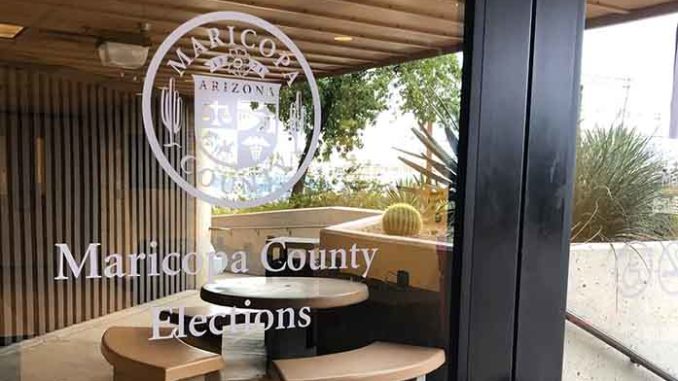
More than four months after state senators tried to begin an audit of Maricopa County’s 2020 General Election process, the man brought in to coordinate the effort says things are formally kicking off this week.
Ken Bennett was appointed by Senate President Karen Fann to serve as the legislature’s liaison with the four companies contracted to do the audit. The long-awaited audit will include a hand count of more than 2 million ballots cast by Maricopa County voters and an inspection of the county’s voting system equipment.
On Wednesday, Maricopa County’s election department is scheduled to beginning delivering its election equipment to the Senate’s auditing team at Veterans Memorial Coliseum. The ballots are slated to be transferred on Thursday, according to a county spokesperson.
Bennett is no stranger to Arizona elections, having served as Senate President from 2003 to 2007. More importantly, he later served as Secretary of State for six years during which time he oversaw 12 statewide or multi-jurisdictional elections.
Tuesday morning, Bennett told KFYI’s James T. Harris he plans for the senate’s audit to be conducted in much the same way as an election. It will include live streaming of the auditors’ activities and video recordings as required by law anytime a live ballot is involved.
“We’re going to have observers from all political parties and independents that will be allowed to be there every moment that any of the ballots are being handled or counted or tabulated,” Bennett said, adding that the media will also be allowed into the facility at the state fairgrounds where auditors began setting up on Monday.
“It’s just a lot of the same fundamental principles that you use when you’re conducting the election itself – those will be used for the audit of that election as well,” Bennett said, adding that it was during his tenure as Secretary of State that Arizona undertook its only statewide recount in history.
Bennett also told Harris he guarantees that what takes place with the audit over the next several weeks “is open and transparent and is auditing the facts” not opinions.
“This has nothing to do with going back to call into question the November 2020 (election),” he said. “But it has everything to do with identifying strengths and weaknesses in our election procedures in Arizona so that the Legislature, the Secretary of State’s Office, or the supervisors, anybody who is interested in trying to make the system better going forward will know exactly what to do.”
Fann contracted Cyber Ninjas and three other companies to perform the audit. Bennett said during Tuesday’s interview that he is confident in the arrangements, even though Cyber Ninjas owner Doug Logan commented several months about his suspicions with the outcome of Maricopa County election.
“But we’re not auditing his opinions as to what might have happened,” Bennett said. “We’re going to audit the facts – and the facts are the votes that Maricopa County residents put on the faces of their ballots. So we’re auditing the ballots and the votes, we’re not auditing the opinions of the auditors.”
Bennett says the audit will include a machine recount but not one using the same Dominion Voting System equipment used during the general election. Then the hand count of the ballots should take three to four weeks relying on dozens of vetted volunteers.
There will also be an audit of the affidavit envelopes used to mail in about 1.9 million of the ballots and an examination of the equipment utilized by the county.
The Senate audit process should take 60 days from the start to the issuance of a final report, Bennett told Harris. The legislature can then address any possible changes in elections procedures if irregularities or anomalies are discovered.
But Bennett was emphatic that nothing he, the Senate, nor the auditors are doing involves revisiting the November 2020 election results.
“Those results are final – the people who got elected are elected,” Bennett said.
